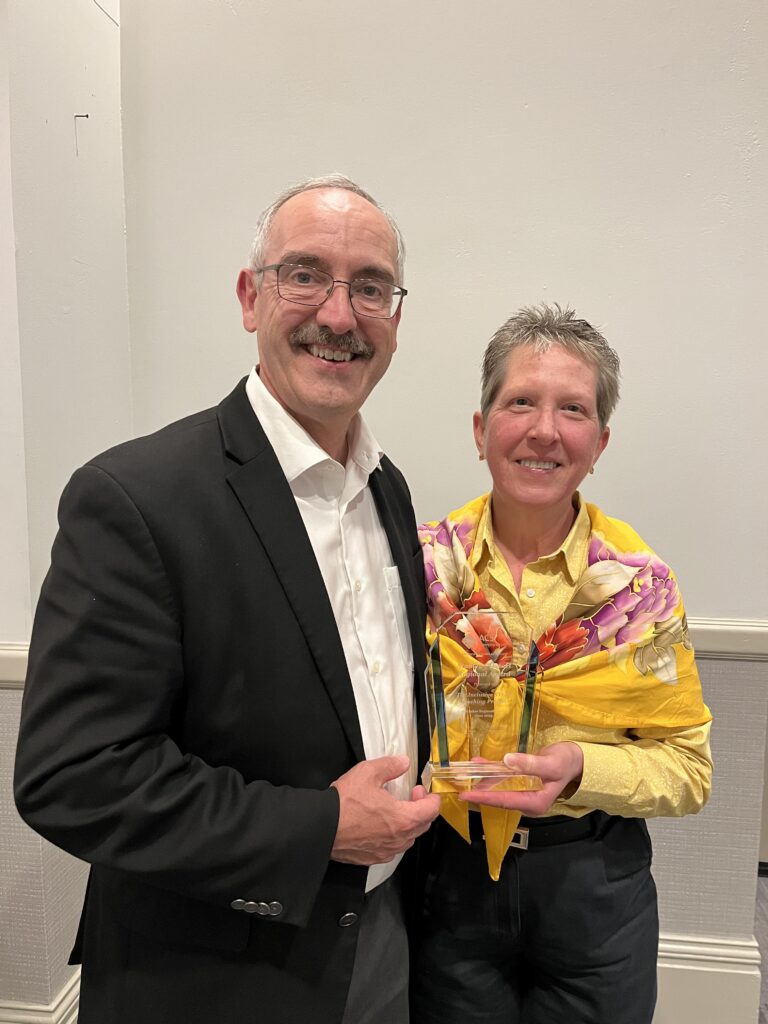 Gina Frey, Ronald and Eileen Ragsdale Endowed Chair of Chemical Education, recently attended the American Chemical Society’s 2025 Great Lakes Regional Meeting, where she represented the Inclusive STEM Teaching Project (ISTP). At the meeting, ISTP was awarded the 2025 Stanley C. Israel Great Lakes Region Award for Advancing Diversity in the Chemical Sciences. Congratulations to Professor Frey and everyone involved in the impactful ISTP project.
Gina Frey, Ronald and Eileen Ragsdale Endowed Chair of Chemical Education, recently attended the American Chemical Society’s 2025 Great Lakes Regional Meeting, where she represented the Inclusive STEM Teaching Project (ISTP). At the meeting, ISTP was awarded the 2025 Stanley C. Israel Great Lakes Region Award for Advancing Diversity in the Chemical Sciences. Congratulations to Professor Frey and everyone involved in the impactful ISTP project.
Gina Frey expressed her appreciation: "I was fortunate to represent the ISTP group last evening in accepting this wonderful award. Thank you, Great Lake Region! We are very honored and I so enjoyed spending the last few days with you. You are an amazing group!"
The Stanley C. Israel Regional Award recognizes individuals and/or institutions who have advanced diversity in the chemical sciences and significantly stimulated or fostered activities that promote inclusiveness within the region. The award consists of a medal and a $1,000 grant to support and further the activities for which the award was made. The nominee must have created and fostered ongoing programs or activities that result in increased numbers of persons from diverse and underrepresented minority groups, persons with disabilities, or women who participate in the chemical enterprise.
The Inclusive STEM Teaching Project (ISTP) is a large, multi-institutional NSF-funded initiative launched in 2018 to advance inclusive teaching practices across STEM, with a significant impact in the chemical sciences. Since 2021, approximately 5,000 STEM faculty have been trained—reaching an estimated one million students annually, particularly those from marginalized backgrounds. The free six-module online course, which has run eight times through fall 2024, has attracted over 13,000 registrants and achieved a course completion rate significantly higher than typical for online offerings. Chemistry instructors make up nearly 25% of completers, with around 1,400 faculty participants benefiting from the program and enhancing instruction for tens of thousands of chemistry students. The course includes modules on diversity, equity, inclusion, and inclusive course design, supported by case studies, reflection activities, and community discussions. Research demonstrates the course significantly shifts educator perspectives, increasing identity awareness, empathy for students, and confidence in inclusive teaching practices.
Gina is the co-PI for Utah on this multi-institutional NSF grant. In this role, she is on the core project management team and leads the research component of the project. Additionally, she was on the content development teams for Modules 4 (Designing an Inclusive Course) and 5 (Creating an Inclusive Classroom Climate). She also facilitated local learning communities consisting of faculty from Wyoming, Idaho, and Utah across multiple ISTP course iterations. Research on this project has been presented at multiple national conference meetings and to the National Academy of Sciences. To date, five peer-reviewed manuscripts have been published, with two additional papers currently under review.
6/9/2025
